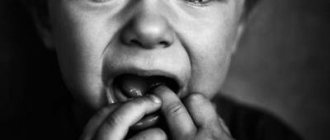Hello, friends.
Almost every person sooner or later faces a problem such as sleep disturbance. Some people cannot fall asleep for a long time, others sleep restlessly and not soundly, but in the end the outcome is the same. The body’s energy decreases, we don’t get enough sleep, we go to work broken and tired. Failure to adhere to a sleep schedule and lack of sleep greatly affects our health. That’s why I want to tell you what to do if insomnia has tormented you and how to improve the sleep of an adult.
I will tell you not only how to get rid of insomnia, but also teach you how to properly prepare for bed, fall asleep correctly, so that your sleep is healthier and more beneficial. I will also tell you about a good method for falling asleep quickly and easily.
Control the lighting
An obvious fact: we fall asleep when it is dark and wake up when it gets light. The hormones melatonin and cortisol are responsible for this.
The first is produced in the thyroid gland only in darkness (the thyroid gland is aware of the part of the brain that is responsible for the biological clock - the suprachiasmatic nucleus in the hypothalamus). Melatonin lowers body temperature, blood pressure and blood glucose levels. Together, these processes cause our body to go into hibernation. When it gets lighter again, melatonin levels drop and sleepiness subsides.
The amount of cortisol, on the contrary, decreases in conditions of darkness and increased melatonin levels. Less cortisol means less stress, deeper relaxation and easier sleep.
If darkness is difficult, melatonin is not produced in the required quantity. And cortisol increases.
The conclusion is simple. If you want to fall asleep at the desired time, make your brain dark. Hang thick curtains on the windows, turn off all the lights, and don’t use social media before bed. The last point is especially important.
Electronic devices produce so-called blue light, which is particularly potent in reducing melatonin levels. And at the same time it increases concentration. We would like to relax and sleep, but if you have seen enough of the blue screen, the body will resist. In general, turn off the TV and computer, put away your cell phone and tablet at least an hour before you plan to go to bed.
Seven simple and effective ways to restore normal sleep
Health
How long do you fall asleep at night? If you often catch yourself thinking that it is already 3 o’clock in the morning, and you are still lying, looking at the ceiling, and thinking about your financial well-being, about the global crisis, about other, various kinds of everyday problems, know that you are not alone! Take, for example, the same Americans.
Recent surveys show that more than a third of people in the United States complain that they have lost sleep due to the rapidly deteriorating economic situation in the country.
Naturally, citizens are primarily concerned about their own financial well-being. This survey, conducted last month by a US public organization called the National Sleep Foundation,
only added fuel to the fire: the fact is that previously, surveys had found constant sleep disturbances among the population for various reasons.
For example, the survey showed that a total of about 72 percent of American adults sleep less than the 8 hours a day required by the average person
. In 2001, this figure was significantly lower – 62 percent. Another 20 percent of adults sleep less than 6 hours a night. In 2001, only 13 percent of citizens did this.
Sleep is a reliable and free cure for stress
Losing sleep entails many more problems and consequences than ordinary chronic fatigue. Lack of sleep, as a rule, threatens serious disturbances in emotional and physical well-being.
; a person’s reaction becomes dulled, he loses the ability to concentrate on little things, becomes irritable, touchy; often falls into a state of deep depression.
This leads to heart disease, diabetes, memory impairment and weakened immunity. Lack of sleep is a problem that is put on par with other global problems related to nothing less than state security
. This is exactly what leading experts in psychiatry and sociology around the world think. After all, it is precisely because of weakening of attention that thousands and thousands of accidents occur a year. Here you have road accidents, accidents at work and much more.
A recent survey by the US National Sleep Foundation found that 54 percent of drivers admitted that over the past year they had at least once found themselves thinking about falling asleep while driving. And 28 percent of respondents even claim that they fell asleep for a split second while driving.
. Some even stated that they drove off the road! Moreover, experiments show that a driver tired from lack of sleep poses a much greater danger on the roads than one who has had a little to drink!
Although in Russia such research is carried out on a much smaller scale than in the United States, it is safe to say that in our country this problem is more than relevant. In this regard, our readers will be interested in learning several very effective ways that will certainly help them restore normal sleep patterns
. So, seven amazingly simple and effective ways to get rid of sleep problems!
1. Stick to a daily routine
Sometimes, in order to get rid of the bad habit of “having difficulty falling asleep”, it is enough to accustom yourself to getting ready for bed at the same time
.
Put off all the essential and not so important things until the morning, and do your best to always go to bed at 11 pm if, for example, you get up at 7 am. At the same time , forget the bad habit of “sleeping in on the weekend”
- it disrupts your schedule and, as a rule, also adversely affects the body. Every day, regardless of weekends, go to bed and get up at the same time. Live in this rhythm for at least a month, and you will be surprised by the positive changes that you will feel in your body.
2. Refrain from consuming food and alcohol before bedtime
Do you remember the phrase said to his wife by the unforgettable Semyon Semyonich from “The Diamond Arm” when she caught him at night trying to have a drink before bed? Like, doctors recommend it. For sleep. In fact, a glass of something strong before bed can help you out once or twice
.
However, no one thinks about the consequences, but they exist. Experiments show that a person who drinks 50 grams of vodka or cognac at night is more likely to wake up at night and not be able to sleep until the morning than someone who goes to bed “sober.” And, of course, you should not eat before bed
. The last meal should be no later than three hours before bedtime. Follow these simple, well-known truths - simplicity is the key to success.
3. If you want to sleep soundly, do physical exercise!
It seems that only the mute did not talk about the benefits of physical exercise. However, you should know that in addition to improving the overall tone of the body, intense physical activity can restore normal sleep patterns. What is meant by "intense"?
No, you shouldn’t immediately fanatically run to the gym to set records.
It is enough to exercise for half an hour several days a week (4-5 days) so that, after these exercises, you need at least two to three minutes to restore your breathing. We are not necessarily talking about evening exercises
- especially since, as a rule, few people have the energy left for this. Give yourself a morning or afternoon for this - it all depends on your daily routine. Again, it is important not to overdo it, as this will cause a side effect that will also keep you awake.
4. Set up your bedroom for relaxation
Make sure that the decor and atmosphere of your bedroom is conducive to relaxation. We are not talking about the need to purchase huge, expensive beds and decorate your bedroom in the style of French kings. But it should be dark enough, quiet, cool (fresh) and free
.
Take the time to arrange your bedroom so that it meets these criteria - after all, it is in the bedroom that we spend most of the time of our lives! Simple changes can go a long way in helping you overcome insomnia
. For example, purchase thick curtains that do not allow light to pass through. And to avoid the consequences of city noise, sometimes it is enough to rearrange the furniture in the bedroom, moving the bed away from the window.
5. Bedroom for sleep and sex
Use your bedroom only for its intended purpose! What does it mean? This means that you should only sleep and have sex there.
.
The moment we go to bed, we want to feel the peace and relaxation that is so conducive to sleep. But if you spend several hours in bed before going to bed, for example, staring at the TV, sending and checking email, talking on the phone, then you involuntarily begin to associate your bedroom with a place of activity
. This is the kind of place where you don't have to relax too much; there you always have to be on guard so as not to say something unnecessary, or accidentally send an important letter to the wrong addressee. And this, you see, does not contribute well to creating a relaxed and complacent “sleepy” atmosphere.
6. Learn to relax your body and free your mind
Simple relaxation techniques such as belly breathing (the best internal abdominal massage), guided visual imagery (try counting sheep!) and other techniques will allow your body to release the tension that has accumulated throughout the day. This will condition your brain in such a way that you will undoubtedly fall asleep soon
.
If you feel that it is a big problem for you to put aside the worries and anxieties of the past day, make the following a rule: place a small notebook or notebook near your pillow at night. Get into the habit of writing down all your problems
(perhaps your plans for tomorrow) before you turn off the light and put your head on the pillow. This symbolic gesture should bring you peace of mind because you know that you didn't miss anything because you wrote everything down. And you will be sure that your affairs will not escape you anywhere, since this notebook lies next to you! As they say, the morning is wiser than the evening.
7. Don’t worry about having trouble falling asleep!
Perhaps for many this will sound like just another psychological trick invented by nosy American psychiatrists and other scientists. Don't let this scare you. Just believe that this method is one of the most effective in the fight against sleep disorders
.
The bottom line is that everyone who suffers from sleep deprivation seems to be struggling to sleep. And struggle, you see, presupposes a certain tension and activity. Stop always thinking that you will never fall asleep, that you will again have to spend several sleepless and meaningless hours in bed, but tomorrow I will have to work, I will feel exhausted, and so on! Instead, tell yourself
-
I will still fall asleep, even if it happens in the morning - I will fall asleep.
Even if I can’t sleep most of the night, it doesn’t matter. The time I sleep will be enough for me to regain my strength and be back to normal the whole next day .
In other words, simply move the hands of your body's clock
so that you do not enter into confrontation with it because you fall asleep much later than you plan. Do this and sleep well!
Maintain good sleep hygiene
Here are a few rules to help you fall asleep at your desired time:
- Ensure silence. Close the windows and doors, try to prevent extraneous sounds from entering your bedroom. If that doesn't work, use a white noise generator.
- Sleep in a cool room. The ideal The Ideal Temperature for Sleep temperature is 15–19 °C.
- Avoid caffeinated drinks, especially in the afternoon. These include not only coffee and tea, but also all kinds of energy drinks and often even regular soda.
- Make sure your bed is comfortable. A mattress that is too soft (or, on the contrary, very hard) and lumpy pillows lead to you unknowingly turning around in bed in search of a more comfortable position. And these movements reduce the quality of sleep.
- Be sure to exercise throughout the day. Regular exercise will increase your chances of healthy rest.
What will help if sleep disturbance is due to stress?
In the modern world, stress is the main cause of sleep disturbance in adults. To alleviate your condition, it is better to use medications.
But it is also necessary to remember that they will not solve the problem itself that led to sleep disturbance.
Eliminate the source of stress or contact a good psychologist to change your life guidelines, attitudes, and views.
Perhaps they are the ones creating stressful situations in your life.
Anxiety, fear, neurosis are the main causes of stress “from scratch.”
A psychologist or psychotherapist can help you get rid of these difficulties. Don’t put off visiting a good specialist for too long.
Normal sleep will be your reward for your efforts and efforts.
Don't eat before bed
The biological clock also responds to diet. We eat during the day, we don’t eat at night. Therefore, if you eat food (or your gastrointestinal tract is busy actively digesting what you eat), the body believes that it is still day. Which means it’s still too early to fall asleep.
Try to eat no later than 2-3 hours before you are supposed to go to bed.
An additional unpleasant effect: knowing that you are fed in the evenings, the body will try to stay awake at this time tomorrow (the day after tomorrow and so on). Therefore, it would be good to make early dinners regular so that the body gets used to it: there is no point in waiting for food late, it’s better to sleep.
Diagnostics
A comprehensive examination helps determine the cause of insomnia. During the examination, the doctor conducts a survey, collects anamnesis and prescribes the following types of examinations:
- laboratory;
- electrocardiography;
- Ultrasound;
- MRI.
Based on these results and the reasons that triggered the stress, the doctor makes a diagnosis and prescribes treatment. Having determined what causes insomnia (anxiety, depression or neurasthenia), you should work to mitigate their manifestations.
Treatment methods for each patient are determined by a neurologist and psychiatrist, but examinations by a cardiologist and endocrinologist are also important. If changes in the functioning of internal organs are suspected as a result of nervous exhaustion and poor sleep, additional examinations are prescribed. If somatic diseases are identified, then it is necessary to undergo appropriate therapy, and it is also possible to conduct polysomnography, which identifies the types of sleep disorders.
Try fasting
Scientists from Harvard have discovered that animals' circadian rhythms (the so-called internal biological rhythms of the body) shift depending on the availability of food. Based on this, researchers suggest the Harvard study finds fasting resets circadian clock that 12-16-hour fasting can help with insomnia that occurs due to jet lag - jet lag.
To restore your sleep pattern, including without jet lag, try a 16-hour fast. Eat dinner early for a few days (for example, around 4:00 pm) and then avoid eating until breakfast (around 8:00 am the next morning). When the regime is normalized, switch to a 12-hour interval between dinner and breakfast. This is good not only for sleep, but also for health in general.
Medicines for insomnia
There are many medications available to help you sleep.
But I would not recommend taking such pills at all.
Firstly, they themselves are not harmless; if overdosed, they can even lead to death, so they are sold with a doctor’s prescription.
Secondly, they are addictive. Once you get hooked on them, it will be more difficult for you to fall asleep naturally, without medications. You need to develop a habit so that the body itself wants to sleep, and not artificially stimulate sleep with the help of drugs. Therefore, it is better to follow my recommendations, and use the drugs when urgently needed, for example, before an important meeting the next day, when you urgently need to get some sleep. But then immediately discard them.
Instead of medications, I would recommend drinking some kind of soothing herbal tea, which includes valerian root, motherwort or other herbs that have a calming and relaxing effect.
Go hiking
With backpacks and tents. At least for three days, but preferably for a week - to increase the effect.
The natural change of day and night helps restore the body's circadian rhythms.
Thus, a study published by Entrainment of the Human Circadian Clock to the Natural Light-Dark Cycle in the journal Current Biology provides the results of testing this theory.
Eight participants in the experiment went on a hike, where they spent a week without artificial lighting, phones or laptops. During this period, all volunteers' biological clocks were rebuilt, synchronizing with solar time: people began to easily wake up at dawn and fall asleep at nightfall. This effect manifested itself most clearly in those who, before the experiment, positioned themselves as owls.
Try sleep deprivation
Another effective, although rather controversial, way to restore sleep patterns is to not sleep for exactly 24 hours. When the long-awaited evening finally arrives, you will probably fall asleep as soon as your head touches the pillow.
This method is, of course, cool. But researchers were able to prove in An Unconventional Release from Depression the connection between daily lack of sleep and the activation of a certain type of brain cells that produce the protein adenosine. It is extremely important for sleep regulation: a sufficient amount of adenosine helps normalize the sleep-wake cycle.
Important details:
- Since the method is quite severe, you can resort to it only after consulting a doctor - the same therapist.
- During periods of sleep deprivation, avoid driving or performing other tasks that require alertness and concentration.
Traditional medicine methods
Non-traditional treatment methods involve the use of medicinal herbs to solve sleep problems. They effectively act not only on adults, but also on children’s bodies. This type of therapy can also be used after suffering stress, severe fatigue and heavy mental work.
The following herbs are allowed:
- Valerian root. Prepare yourself or purchase it in the form of drops or tea (dry composition placed in a filter - bags). For those who do not tolerate the bright aroma of valerian, it is recommended to purchase the medicine in tablet form.
- Pharmaceutical camomile. Restores sleep and has a milder effect, unlike valerian. It is allowed to use infusion or aromatic oil to fumigate the room.
- Oregano. Relieves nervous tension and excitability after stressful situations. Brew as a simple tea to enhance relaxing properties. It is recommended to add natural honey to this healthy drink instead of granulated sugar. This type of medicinal herbs is prohibited from being used for dysfunction of the reproductive system in men, during pregnancy and breastfeeding, and for diseases of the digestive system.
- Melissa. Has a mild sedative and hypnotic effect. It is recommended for use in cases of stress, excessive psycho-emotional stress and severe irritability. Used in the form of tea, decoction, infusion, and even as a warm bath.
- Mint. Effective when combined with lemon balm. It normalizes the nervous system: relaxes, calms. It is recommended to take a water infusion of mint, which is prepared for 20 minutes. A compress will help against insomnia: combine crushed mint, rose hips, and egg white in a separate container. Mix thoroughly and apply the mixture overnight for 20 minutes.
After stress, thyme decoction is also considered an excellent remedy for restoring and strengthening the vitality of the body. It is taken 30 minutes before bedtime in a warm form.










